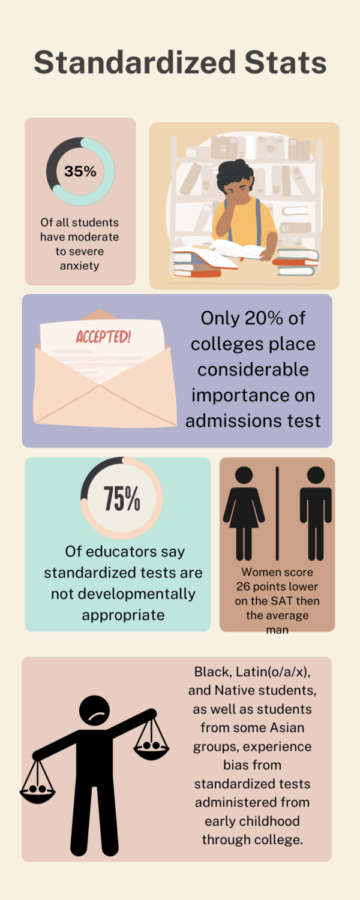Standardized testing my patience
December 16, 2022
Standardized testing is unnecessary and can ultimately be very harmful to a student’s self- esteem.
Even at the national level, researchers have found evidence that standardized test scores, such as the SAT and ACT are worse predictors of a student’s success in college than other measures, like high school grade point average.
The ACT includes four multiple- choice tests: English, mathematics, reading and science, with an optional writing test. These tests are designed to measure readiness for success in post-secondary education.
The ACT is more common in the Midwest, Southwest and deep South. While the SAT dominates on the East and West Coasts. If prospective college students do not live in these areas, it is pointless to take these tests.
Nearly 80 percent of United States bachelor’s degree granting colleges and universities are not requiring the ACT or SAT scores from students enrolling in fall 2022. According to The Fairtest, that number is at an all-time high.
Inaccuracy is not just found in public universities. Colleges such as Columbia, Cornell and Stanford are among those moving to test- blind or test-optional requirements.
For instance, at Youngstown State University, students must have an ACT score of at least 17 or a composite SAT score of 920.
However, they have a test- optional admission policy approved through September 2023. In the absence of testing scores or those that fall below the requirement, students will be evaluated on academic performance or core curriculum in lieu of test scores.
Standardized test scores are not something colleges should look at when it comes to measuring academic ability.
Standardized testing only evaluates students on their fast- thinking skills and does not truly measure intelligence. These tests do not value creativity, problem solving, artistic ability or other factors students may excel in.
For example, the 42nd President of the United States, Bill Clinton, scored a considerably low score of 22 on his ACT. Clinton then went on to attend Yale Law School in 1970.
Clinton’s score just proves that these standardized testing scores do not truly measure a person’s intelligence. If he had received a higher score, it would not have made him more qualified to be president.
Along with testing not being an exact measure of a student’s academic ability, standardized tests are not beneficial to the student.
Normally in school when students take a test, they receive some sort of advice on how they can perform better.
Students do not get that with standardized testing.
Results are not even received by the student nor teacher until several months later.
On top of scores taking so long for the scores to come back, students do not receive information on how they can improve and do better next time.
In addition to not receiving ample feedback, for standardized testing it is nearly impossible to study, students are not told what will be on the test.
Most of the time students will not even know how many questions will be on standardized tests. There is no way to accurately study for a test that could ask a math question from something learned five years ago.
For example, students who are enrolled in Advanced Placement and honors math classes may be questioned on math material they have not studied since middle school.
One of the most important things learned in school is how to study for average school testing and quizzes, but that is irrelevant when it comes to standardized testing.
Never in a student’s school career will they take a test that they cannot study for other than the standardized testing.
When a student writes a creative response in the margins of a test, they do not realize that actual humans will never see what they have written.
Instead, machines grade these tests, and a creative answer that does not follow the format is considered incorrect.
On top of tests not valuing creativity, tests also do not value diversity. There is a wide range of differences among students, yet we base all evaluations on the same test.
These students have diverse cultures, different dreams, different academic backgrounds, and different motivators.
It is surprising that standardized test treat students as if they are essentially the same instead of unique individuals.
We are evaluating students’ intellectual capacity based on scores from tests that remain the same even though students, curriculum, and educational environments continue to evolve.
The controlled and artificial learning environment of standardized testing is not beneficial to a lot of students. Most kids learn in an environment where they can ask questions, talk to their peers and move around when needed.
Yet we put them in a new classroom and except them to perform at the same level they were performing at when they were in their classroom.
Controlled testing environments creates stress that most students this stress creates an environment that most students are not used to, so of course they are not going to be able to do their best.
While some students are able to handle a certain level of stress, others fold.
Holding all students to the same standard is not right. When their brain is in a panicked state, it can become overwhelming and psychologically harmful.
High order thinking that is needed for peak performance is completely thrown out the window when their brain is stuck in an anxiety riddled response.
Also, standardized test scores are used by districts and states to show student progress, measure how students are performing in different schools, and compare how diverse groups of students perform compared to others.
Standardized testing is problematic because children can learn something way more valuable while taking a test. Taking away classroom time to compare students and other schools is not beneficial to them.
It is also important to note that standardized tests supply a false sense of security to parents and teachers.
If a student scores well on a test, then it is assumed that they know the material, but there are many people who could very well just be lucky guessers.
Overall, some kids may just be gifted when it comes to taking standardized tests while others are not gifted in the same way
For example, a group of Harvard graduates were asked why it is colder in the winter and warmer in the summer. The majority of them answered the question incorrectly. Despite being proficient test- takers, they did not understand fundamental principles that required deeper understanding.
In fact, a study of the class graduating in 1992 found that the exam over-predicted their academic performance over four years.
This graduating class had the highest-class average ACT score but the worst academic performance overall.
Furthermore, the ACT was built on a biased system. The Mississippi Higher Education Board instituted an ACT requirement for admission in 1962 that was eight points higher than the average Black student’s score.
The fact that we are still using a system that allowed and justified systemic racism is beyond unacceptable.
According to a federal court, Mississippi’s justification of the point difference was done “soon after the court ordered admission of James Meredith to the University of Mississippi because it deterred black enrollment.”
Specifically, the Supreme Court cited the ACT cut-off as a factor that denied African Americans access to a majority of the universities in the state.
Despite this, Mississippi still uses ACT cut-offs to figure out eligibility for admissions and scholarships.
Standardized testing through grade school should just be completely removed, the ACT and SAT do not necessarily need to scrapped.
Tests of this nature can be used for scholarship opportunities and can also be used for teachers to find what needs improvement with ample feedback if a student chooses to take them.
That said, since the ACT and SAT are still utilized as scholarship criteria, students should have the opportunity to opt into testing. It wshould not be required as state or district testing.
Standardized tests should not decide a student’s academic ability or hold them back from attending their dream school.



